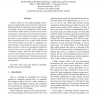Free Online Productivity Tools
i2Speak
i2Symbol
i2OCR
iTex2Img
iWeb2Print
iWeb2Shot
i2Type
iPdf2Split
iPdf2Merge
i2Bopomofo
i2Arabic
i2Style
i2Image
i2PDF
iLatex2Rtf
Sci2ools
113
click to vote
ICTAI
2003
IEEE
2003
IEEE
Eliminating Redundancies in SAT Search Trees
Conflict analysis is a powerful paradigm of backtrack search algorithms, in particular for solving satisfiability problems arising from practical applications. Accordingly, most recent satisfiability solvers implement forms of conflict analysis, at least to some extent. In this paper, a branching criterion initially introduced by Purdom [16] is revisited and extended. Contrary to his author’s a priori analysis, it is shown very efficient from a practical point of view in that it allows search trees in SAT solving to be pruned in a significant way while obeying an interesting time and space trade-off. More precisely, we show that redundancies during the search process can be avoided without adding new constraints explicitly. Moreover, the technique can be used not only to prune branches in the search tree, but also to derive implied literals. Extensive experimental results illustrate the feasibility and practical interest of this approach.
Artificial Intelligence | Backtrack Search Algorithms | Conflict Analysis | ICTAI 2003 | Search Tree |
Related Content
| Added | 04 Jul 2010 |
| Updated | 04 Jul 2010 |
| Type | Conference |
| Year | 2003 |
| Where | ICTAI |
| Authors | Richard Ostrowski, Bertrand Mazure, Lakhdar Sais, Éric Grégoire |
Comments (0)

